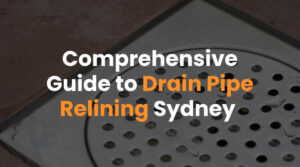What is a stormwater drain?
A stormwater drain, sometimes referred to as a storm drain or stormwater system, is a drainage system specifically designed to manage rainwater overflow from rainfall events. Unlike a regular shower drain that handles water from your hot water system and is designed for smaller water flow, a stormwater drain is built to accommodate large amounts of water, often due to heavy rainfall. These storm drains ensure that excessive water is redirected away from your property, preventing potential water damage. It’s essential to differentiate between the two since a blocked stormwater drain can have more severe consequences due to its role in the stormwater drainage system.
Signs of a Blocked Stormwater Drain
How can you tell if your drain is blocked?
Detecting a blocked stormwater drain can sometimes be a subtle endeavour. Here are a few signs:
- Water Pooling: If water isn’t escaping into the drainage system after rainfall, and instead, you notice rainwater that sits around in your garden or near the drain, it’s a clear sign of a blocked stormwater pipe.
- Gurgling Noises: When you hear unusual sounds from your drains, it indicates air trying to escape through the pipe, signalling a possible blockage.
- Bad Odours: A foul smell emanating from the drain suggests stagnant water, indicating the drain is blocked.
- Slow Drainage: If water drains slower than usual after a rainfall event, your stormwater drain is blocked or partially blocked.
Immediate repercussions of a blocked drain
A blocked stormwater drain can lead to several immediate problems:
- Water Overflow: Inadequate stormwater drainage causes water to overflow, leading to potential water damage to your property.
- Gutter Overflow: A blocked gutter can cause water to spill over the sides, potentially damaging your home’s exterior or foundation.
- Water Contamination: Blocked stormwater pipes might cause water to become stagnant, leading to contamination and health risks.
- Foundation and Landscape Damage: Excessive water that can’t find its way to the drainage system might erode the landscape or weaken a home’s foundation.
Causes of Blocked Drains
Blocked drains are a common household issue, and the causes of blocked drains can be vast. Here’s a look into some prevalent reasons:
- Tree Roots: One of the most notorious culprits, tree roots, can infiltrate stormwater pipes, leading to severe blockages.
- Debris and Leaves: Accumulation of leaves, especially during the fall, and other debris can cause clogs, particularly in stormwater drains.
- Foreign Objects: Items that shouldn’t find their way into drains, like toys or sanitary products, can result in a blocked drain.
- Fat and Grease: Often from our kitchens, fats and oils can solidify in the pipes, causing blockages over time.
- Hair: Especially in shower drains, accumulated hair can create significant clogs.
- Caustic Soda and Chemical Residues: Overusing chemical drain cleaners can sometimes leave residues that contribute to blockages.
Common Causes of Blocked Stormwater Pipes
Stormwater pipes have their unique challenges compared to regular household drains. Let’s delve into the common causes of blocked stormwater pipes:
- Rainfall: After a heavy rainfall, stormwater pipes can be overwhelmed if the stormwater system isn’t well-maintained, leading to blockages.
- Gutter Overflow: A blocked gutter can cause water to overflow, carrying with it debris that can clog stormwater pipes.
- Sediment Build-up: Over time, sediments and dirt can accumulate in stormwater drains, causing blockages.
- Improper Pipe Installation: Incorrectly laid stormwater pipes can lead to recurrent blockages.
- Broken Pipes: A damaged stormwater pipe can cause water to escape and might result in soil entering the drain, creating a blockage.
Grate Matters
Grates play a pivotal role in preventing debris from entering the stormwater drainage system:
- Grate Maintenance: Regularly checking and cleaning grates can prevent larger items and debris from entering stormwater drains and pipes.
- Mesh Screens: Installing mesh screens over grates can prevent smaller debris, like leaves, from clogging up the system.
- Clearing Blockages: If you find water pooling near the grate, especially after rainfall, it’s a sign that there’s a blockage. Using tools like a drain auger or seeking drain cleaning services can help.
- Proper Grate Installation: Ensure that grates are correctly installed to facilitate water flow and prevent debris accumulation. This way, the risk of stormwater drain blockages can be minimised.
How to Unblock a Stormwater Drainage System
Having a blocked stormwater drainage system can lead to numerous problems, from pooling water to potential property damage. Thankfully, there are several methods available to unblock these drains, ranging from natural home remedies to professional tools. Below, we’ve highlighted various methods to address a blocked stormwater drain.
Natural Solutions for Blockages
Baking Soda and Vinegar Mixture: A tried-and-true method, combining baking soda and vinegar creates a chemical reaction that can break down many clogs. To use, pour a cup of baking soda into the blocked drain, followed by an equal amount of vinegar. Allow the mixture to sit for 30 minutes to an hour, and then flush with hot water.
Hot Water Flushing: Regularly flushing your stormwater system with hot water can help dissolve minor blockages and prevent sediment buildup. Ensure the water flow is strong, pushing through any potential clogs.
Mechanical Methods
Using a Plunger: The suction from a plunger can help dislodge blockages. Ensure you have a good seal and use strong, pumping actions to create a vacuum that can pull the blockage out.
Utilising a Plumbing Snake or Auger: This is a long, flexible tool that can be manually rotated to dislodge blockages deep within the drain. Push the snake down the drain until you reach the blockage, then turn and manoeuvre it to break up the clog.
High-Pressure Water Jetting: Also known as hydro jetting, this method uses high-pressure water to clear blockages. It’s particularly effective for blockages caused by tree roots or heavy sediment buildup. This method is best left to professionals with the right equipment.
Commercially Available Solutions
Chemical Drain Cleaners: Available in most hardware stores, these solutions can dissolve blockages. However, they’re often harsh and can damage pipes or harm the environment. Always follow manufacturer’s instructions and wear protective gloves and eyewear.
Enzymatic Drain Cleaners: These cleaners contain bacteria that eat away organic material causing a block. They’re more environmentally friendly than chemical cleaners but might take longer to work.
Inspection and Diagnostic Tools
CCTV Drain Cameras: For stubborn blockages or recurring issues, a CCTV drain camera can help identify the exact location and nature of the blockage. This tool is often used by professional plumbers to diagnose complex drain problems.
Drain Locating Equipment: This helps in determining the exact location of the drain and any potential blockages, especially useful for larger properties or complex stormwater systems.
Manual Clearing Techniques
Removing the Grate and Clearing Debris: Sometimes, the blockage is right at the surface. By removing the grate, you can manually clear away leaves, twigs, and other debris that might be causing a blockage.
Hand Clearing Solid Obstructions: Using gloves, you can often reach in and manually remove solid items or clumps of material that may be causing a blockage close to the surface.
Prevent Blocked Stormwater Pipes
Preventing blockages in stormwater pipes is crucial for maintaining a functional drainage system and safeguarding your property from potential water damage. Here are some proactive measures to keep your pipes flowing smoothly:
- Regular Cleaning: Ensure your grates and gutters are cleaned regularly to avoid debris build-up. This prevents leaves, twigs, and other debris from entering and clogging the stormwater system.
- Tree Root Barriers: Consider installing root barriers if trees are close to your stormwater system. This can prevent tree roots from infiltrating and blocking the pipes.
- Install Guards and Screens: Placing guards or screens over stormwater inlets can effectively prevent larger debris from entering the system.
- Routine Inspections: Periodically inspect your stormwater system for early signs of blockages or damage. Addressing problems early can prevent more significant issues down the line.
- Avoid Dumping Grease and Oils: Ensure that oils or grease aren’t poured into drains as they can solidify and cause blockages.
- Educate the Household: Ensure all family members are aware of what can and can’t be flushed down drains.
Unblocking Tips From a Plumber
A seasoned plumber has seen it all when it comes to blocked stormwater pipes. Here are some insider tips:
- Hot Water Works Wonders: Regularly flushing your pipes with hot water can prevent the build-up of sediments and minor blockages.
- Natural Solutions: Before resorting to chemical cleaners, try a mixture of baking soda and vinegar followed by hot water to dissolve blockages.
- Invest in a Good Plunger: A high-quality plunger can clear many blockages effectively without needing specialised tools.
- Avoid Chemical Drain Cleaners: They can be harsh on your pipes and aren’t eco-friendly. Use them as a last resort.
- Know Your System: Familiarise yourself with the layout of your stormwater system. This will help you identify where blockages might occur and understand the best methods for addressing them.
When to Call a Professional to Unblock a Stormwater Drain
While many minor blockages can be resolved with simple DIY methods, there are times when the expertise of a professional plumber is indispensable. A professional plumber brings specialised equipment, such as high-pressure water jetters and CCTV drain cameras, which can efficiently locate and resolve blockages that might be beyond a homeowner’s reach. Additionally, professional drain cleaning ensures a thorough clearing of the system, extends the lifespan of your drains, and provides peace of mind with guaranteed results. In cases of persistent or severe blockages, or when in doubt, it’s always wise to rely on the knowledge and tools of the experts.








